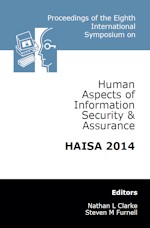In 2014, we launched our open-access repository which offers full text access to conference proceedings from many of our events including the INC and HAISA series. These papers are free to access and distribute (subject to citing the source).
» Openaccess proceedings » Eighth International Symposium on Human Aspects of Information Security & Assurance (HAISA 2014)
 | Eighth International Symposium on Human Aspects of Information Security & Assurance (HAISA 2014) |
Title: Improving internet banking security by using differentiated authentication based on risk profiling
Author(s): Martin Butler, Rika Butler
Reference: pp137-149
Keywords: Online banking, User authentication, Differentiated authentication, Risk profiling
Abstract: Online security remains a challenge to ensure safe transacting on the internet. User authentication, a human-centric process, is regarded as the basis of computer security and hence secure access to online banking services. The increased use of technology to enforce additional actions has the ability to improve the quality of authentication and hence online security, but often at the expense of usability.
The objective of this study was to determine if there are factors that could be used to create different authentication requirements for different users. That is, could internet banking users, for example, be directed to different authentication regimes after classifying their potential safety profile based on the browser that they are using?
A web-based survey was designed to determine online consumers’ perceptions of their skills and competence in respect of passwords creation and management practices, and capture demographical data as well as choices in browsers used.
After using a construct for password performance, derived from previous research on the same dataset, the browser used was compared with use of poor password practices. Based on the results a case could be made to have different authentication methods for consumers based on their browser selected to ensure a safer online environment
Download count: 2361
How to get this paper:


PDF copy of this paper is free to download. You may distribute this copy providing you cite this page as the source.
